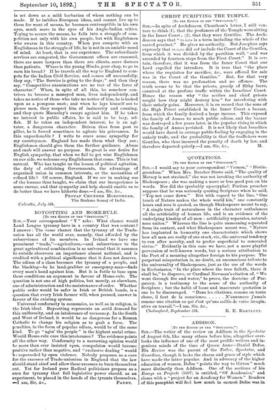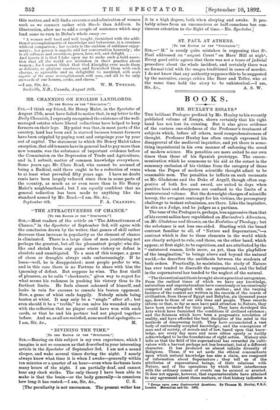ADDISON.
[TO THE EDITOR OF THE "SPECTATOR."] SIR,—The writer of the review on Addison in the Spectator of August 6th, like many others before him, altogether over- looks the influence of one of the most prolific writers and in- genious minds of the time of Queen Anne—Daniel Defoe. His Review was the parent of the Tatler, Spectator, and Guardian, though it lacks the charm and grace of style which have made the latter popular. And in advocacy of the higher education of women, Defoe "points the way to Girton" much more distinctly than Addison. One of the sections of his Essays on Projects (1697) is entitled, " Of Academies," and closes with a " project for an Academy for Women." Readers of this pamphlet will feel how =mweh in earnest Defoe was in
this matter, and will find a reverence and admiration of women such as we connect rather with Steele than Addison. In illustration, allow me to add a couple of sentences which may lead some to turn to Defoe's whole essay :—
" A woman well bred and well taught, furnished with the addi- tional accomplishments of knowledge and behaviour, is a creature without comparison ; her society is the emblem of sublimer enjoy- ments ; her person is angelic and her conversation heavenly ; she is all softness and sweetness, peace, love, wit, and delight And herein it is that I take upon me to make such a bold asser- tion that all the world are mistaken in their practice about women ; for I cannot think that God Almighty ever made them so delicate, so glorious creatures, and furnished them with such charms, so agreeable and so delightful to mankind, with souls capable of the same accomplishments with men, and all to be only stewards of our houses, cooks, and slaves."
—I am, Sir, &c., W. M. TWEEDIE.
Sackville, N.B., Canada, August 20th.



































 Previous page
Previous page